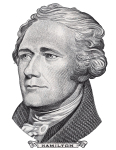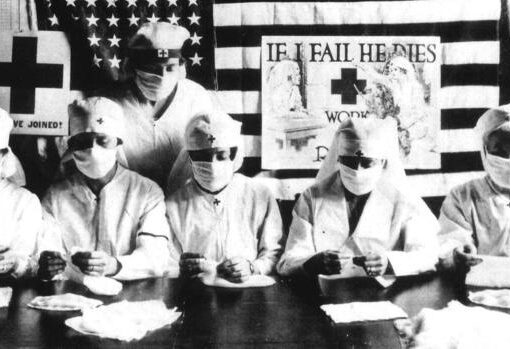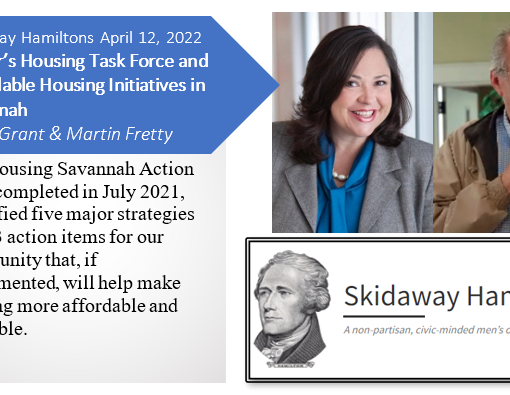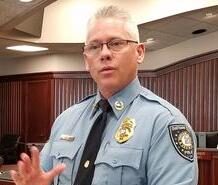Meeting Recap
Margaret Coker, Editor-in-Chief of The Current
Reviving American Democracy: How In-Depth Local Journalism Fosters Engaged Citizenry
Margaret Coker spoke via Zoom to a group of Skidaway Hamiltons and Abigails on January 18, 2022.
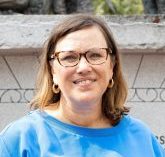 This nation is founded on the idea of an engaged citizenry, which implies that journalism is a public service. Democracy is about the public being informed as people choose who they want to govern us. However, we are awash in misinformation. American journalism is in crisis. More than 2000 counties in the U.S. have no newspaper. Georgia is one of the biggest news deserts in the country – 30 of the 159 counties in Georgia have no newspaper. When news declines, government corruption festers and government costs increase. In journalism today, profit rules. But this does not provide the public service that local journalism should provide. Across Georgia and in coastal Georgia in particular, many key stories are not covered. Among these are the environment, the courts, economic corruption, and business development. How news reporting is funded must change – profits rule in the major media news outlets, but journalism is still needed to cover local issues. So, a non-profit model may be the answer for local coverage. And nationwide there are several examples of this model in big and small cities, liberal and conservative communities (examples include ProPublica, the Marshall Project, OklahomaWatch, Mississippi Center for Investigative Journalism).
This nation is founded on the idea of an engaged citizenry, which implies that journalism is a public service. Democracy is about the public being informed as people choose who they want to govern us. However, we are awash in misinformation. American journalism is in crisis. More than 2000 counties in the U.S. have no newspaper. Georgia is one of the biggest news deserts in the country – 30 of the 159 counties in Georgia have no newspaper. When news declines, government corruption festers and government costs increase. In journalism today, profit rules. But this does not provide the public service that local journalism should provide. Across Georgia and in coastal Georgia in particular, many key stories are not covered. Among these are the environment, the courts, economic corruption, and business development. How news reporting is funded must change – profits rule in the major media news outlets, but journalism is still needed to cover local issues. So, a non-profit model may be the answer for local coverage. And nationwide there are several examples of this model in big and small cities, liberal and conservative communities (examples include ProPublica, the Marshall Project, OklahomaWatch, Mississippi Center for Investigative Journalism).
Ms. Coker worked with the Atlanta Journal-Constitution, the Wall Street Journal, and the NY Times. She and her husband moved here full-time in 2019. She spoke to locals whom she respected about filling the investigative news vacuum in Savannah. She started The Current with her former AJC colleague Bert Roughton. In May 2020, Susan Catron, formerly executive editor of the Savannah Morning News, joined The Current, which launched in the fall of 2020. The Current (thecurrentga.org) is a non-partisan, non-profit news organization that covers news in coastal Georgia. It is the only non-profit news organization in Georgia, and its format is digital only because that is far cheaper than print. It currently issues two email newsletters per week but expects to expand to four per week in the summer. It also shares stories with other quality, non-profit news organizations, like Georgia Health News in Atlanta. The Current’s readers enjoy longer investigative stories. 29% of the visitors are people of color, 23% are young (under 35), and 60% are female.
The Current’s funding sources include major donors, foundations, subscribers, and grants. They raised $325k in 2021 from 550 major donors. Local foundations have endowed a couple of reporter positions (environment and public safety). People listening today can get content for free but can help by making tax-deductible contributions. They can also share what stories are of interest to them.
During Q & A, Ms. Coker described her in-depth coverage of the Ahmaud Arbery trial and the long history of questionable police actions in Glynn County. She was asked if The Current currently covered Savannah’s city government. She said The Current has no one on staff to cover the Savannah city beat. She commented on Savannah’s odd government structure with its strong City Manager, weak Mayor, and a City Council that can put “many wrenches in place”. Questioned about environmental stories. Ms. Coker said Mary Landers, formerly of the Savannah Morning News, is now on staff as a full-time environmental reporter. They are looking for suggestions for environmental stories. Regarding Afghan refugees, she said her husband had been Afghan bureau chief for the WSJ, and they plan to cover the resettlement effort. Regarding misinformation, she said that they don’t have the resources to go after every misinformed story they encounter, but they try to tackle it whenever possible.
The Current is non-partisan. It takes no advocacy positions. Its donors are split evenly between conservatives and liberals. It does not post letters to the editor but will answer them privately. Regarding expanding readership, Ms. Coker said that Google has helped them optimize their content articles for search. They also engage with readers through presentations in high schools and other organizations. Regarding staff diversity, Ms. Coker said they want the staff to “look like” the communities they cover. Over the last 10 years, however, layoffs have scared potential journalists away from the profession so there are few candidates with the qualifications necessary. The Current is partnering with Savannah State and U. Georgia to bring in young reporters as interns, which will add to the staff diversity. The Current is female-run (Margaret and Susan Catron) and have many writers working as contractors that include several POC and females.
